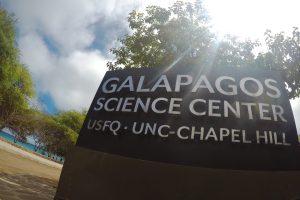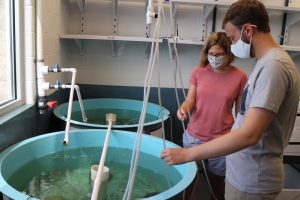The Center for Galapagos Studies has awarded three new seed grants to UNC-Chapel Hill researchers from the Gillings School of Public Health, the Carolina Population Center and the College of Arts and Sciences to launch new projects in the Galapagos this summer.

These Seed Grants enable UNC faculty to engage in new research or further existing research projects and foster UNC’s relationship with the Universidad San Francisco de Quito through their joint Galapagos Science Center facility.
Within the College of Arts and Sciences, a seed grant has been awarded to Janet Nye, associate professor in the department of Earth, marine and environmental sciences and the Institute of Marine Sciences. Her project is titled “Trophic control of fisheries production in the Galapagos and beyond.”
Nye brings a professional background in climate science and oceanography to her work in the Galapagos. Her goal for this research is to develop and refine mass balance food web models, which depict the flow of energy through an ecosystem, in order to understand the relationship between the ecosystem’s oceanography, the species living in the habitat and its upper trophic level production. The upper trophic levels of marine ecosystems generally include large fish, sharks and whales. Global climate projections suggest a drastic decline of fish populations in some ecosystems.

Her current hypothesis is that warming and trophic amplification, a process that exacerbates changes in biomass across trophic levels, will reduce upper trophic level production and fisheries catches across a diverse set of marine ecosystems. In other words, ocean warming from climate change will decrease the fish population in a variety of ecosystems, which, among other issues, decreases local fisheries’ production and can harm local economies and populations.
The work Nye is conducting in the Galapagos will allow her to both inform regulations and management of local fisheries to support the economy and apply the results more broadly to understand the consequences of climate change on marine ecosystems and their trophic levels.
In order to understand what controls fish production, Nye will study food webs across different regions that share similarities in their marine species but have different oceanographic and biogeochemical properties, such as temperature and the role of plankton in maintaining the ecosystem. These differences will allow Nye to track the effects of these changes in oceanographic and biogeochemical properties on upper-level trophic production. She will focus on the Central and Southeastern region of the islands, which contains two of Galapagos’ main fishing ports.
“As a biologist, to visit the Galapagos is a dream come true,” Nye said. “It feels like I have trained my whole career to have the opportunity to do research that helps protect such a unique ecosystem upon which so many depend. I’m excited to learn where my research in fisheries oceanography can be most useful!”
By Andy Little ’24, Center for Galapagos Studies
